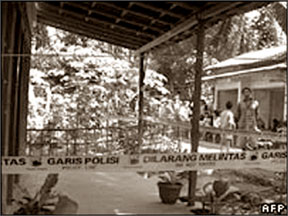What next for Jemaah Islamiah?
|

Jemaah Islamiah has been blamed for the Bali attack in October 2002
|
The man police describe as the terrorist suspect they most wanted to
catch is waiting to be questioned about a string of bomb attacks in the
country, and about the workings of Indonesia's most active militant
group, Jemaah Islamiah.
But the most burning question in many people's minds here is what
effect his arrest will have on the shadowy organisation itself.
Jemaah Islamiah (JI) is blamed for the 2002 attacks in Bali that
killed more than 200 people, as well as bombings in Jakarta and Sulawesi.
But little concrete information is known about who exactly runs it, and
how its different parts are linked.
Police say Abu Dujana is head of the group's military wing,
responsible for logistics, strategy and weapons. Some analysts go
further, and label him as the overall chief of the organisation.
Most observers say his arrest will be a severe blow to JI.
Sidney Jones, who is head of the International Crisis Group in
Indonesia, says that Abu Dujana has "virtually every single bit of
information that's known about JI.
The structure would be known, the financing would be known, the
membership, the leadership - there's a chance he could blow it all
open".
Many analysts believe that JI has already been weakened, due to a
spate of arrests by counter-terrorism forces.
Hundreds of suspected militants have been arrested or killed,
including high-profile figures like JI bomb-maker Azahari Husin.
That is another reason why Abu Dujana's capture could hurt the
organisation, says Sidney Jones.
|

Abu Dujana was arrested at a house in central Java on Saturday |
Not only is he alleged to be one of its most senior members, but he
is widely seen as someone with experience of previous operations, and
past links to al-Qaeda; someone who trained for several years in
Afghanistan's mujahideen camps, and is believed to have met Osama Bin
Laden.
Experience like his is now in short supply for groups like JI, she
says.
Since the Bali nightclub bombings in 2002, which killed 202 people,
internal splits are thought to have grown within JI.
That may make it harder for the group to launch attacks on the same
kind of scale as the Bali bombings, but it has also made it harder for
the security forces to track them. The splits have led to the rise of
smaller, more extreme, splinter groups like that believed to be led by
Noordin Mohamed Top.
He has been described as the number one fugitive in South East Asia,
and he is still at large.
The fact that JI, and other groups like it, are still able to launch
deadly attacks was highlighted earlier this year when security forces
found large amounts of bomb-making materials during raids on JI
hideouts.
Police said there was enough material to dwarf previous Indonesian
bomb attacks. The capture of Abu Dujana could expose the long-secret
workings of the group's highest echelons, but it will not stop
recruitment or solve the problem facing police in Indonesia.
BBC
|
